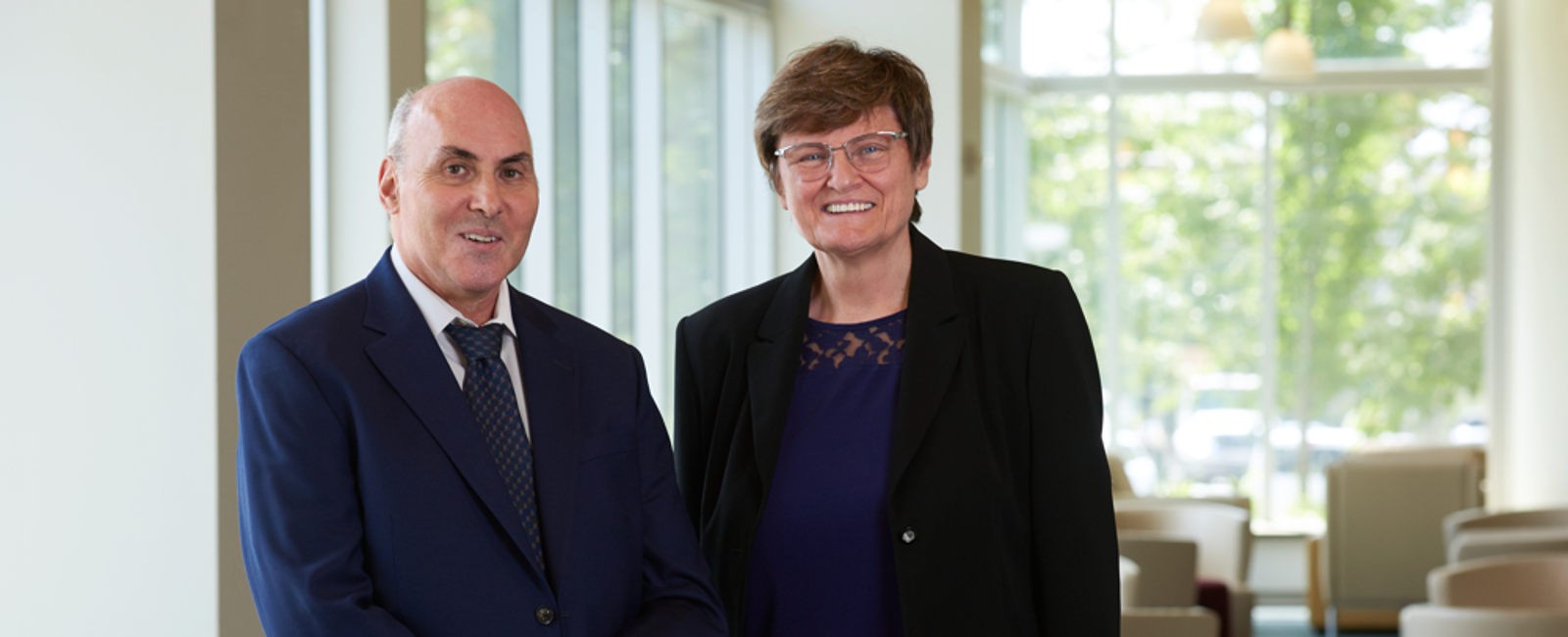
The Nobel Prize in Medicine has gone to Katalin Karikó and Drew Weissman, Frontiers of Knowledge laureates in 2022
Katalin Karikó and Drew Weissman, BBVA Foundation Frontiers of Knowledge laureates in Biomedicine, were announced today as winners of the 2023 Nobel Prize in Medicine. The committee at Stockholm’s Karolinska Institutet bestowed the prize on the two researchers for their combined discoveries, which enabled the development of messenger RNA vaccines against COVID-19.
2 October, 2023
Karikó (Szeged, Hungary, 1955) and Weissman (Lexington, Massachusetts, United States, 1959) share the Nobel Prize in Physiology or Medicine “for their discoveries concerning nucleoside base modifications that enabled the development of effective mRNA vaccines against COVID-19,” in the words of the Nobel citation. “Through their groundbreaking findings, which have fundamentally changed our understanding of how mRNA interacts with our immune system, the laureates contributed to the unprecedented rate of vaccine development during one of the greatest threats to human health in modern times.”
In 2022 the two received the BBVA Foundation Frontiers of Knowledge Award in the Biology and Biomedicine category, jointly with Robert Langer, “for their contributions to messenger RNA (mRNA) therapeutics and delivery technology that enable our own cells to produce proteins for disease protection and treatment,” according to the award citation.
To date, the most outstanding product of the laureates’ work, said the committee, has been “the timely and prompt development of SARS-CoV-2 vaccines,” which have proved to “effectively provide protection against severe COVID-19.” The committee also noted that the vaccines which contained the pandemic were just the first wave of a technology that is “set to expand to other therapeutic areas such as autoimmunity, cancer, neurodegenerative disorders, enzyme deficiency, and other viral infections.”
A technology that teaches the body to “manufacture” its own treatment
Karikó and Weissman, a biochemist and immunologist respectively, were the authors of critical breakthroughs in the chain of scientific findings that have made messenger RNA therapies a reality, with a technology that gets the body’s own cells to produce the molecules needed to fight off disease.
For the committee, Karikó and Weissman, professors at the University of Pennsylvania (United States), “together developed mRNA modification methods to prevent the immune system from recognizing and destroying it,” when introduced into the body.
In the case of the BBVA Foundation award, Karikó and Weissman were co-laureates with Robert Langer, a professor at Massachusetts Institute of Technology (United States), who showed that it was possible to take nucleic acid molecules – such as RNA, standing for ribonucleic acid – and encapsulate them in nanoparticles for release into the body. This insight, said the committee, enabled “packaging of macromolecule therapeutics including mRNA and delivering them into cells, allowing the cellular translation machinery to synthesize the protein/antigen.”
The molecule that carries instructions to synthesize proteins
DNA and RNA are the molecules (chemically, nucleic acids) that contain the information needed for any living being to manufacture proteins. Each organism’s DNA is unique and housed in all of its cells. What RNA does, put in the simplest terms, is to copy information from DNA and transport it to the protein-making machinery within the cell. Conceptually RNA therapy starts from the assumption that it is possible to design RNA “to order” in the lab, so it contains the information needed to make any protein, be it a therapeutic compound or, as in COVID-19 vaccines, a fragment of a virus. Once inside the cell, this synthetic RNA will be read by the cellular machinery, which will start producing the target proteins.
The mRNA vaccines against COVID-19 contain RNA with instructions to make the S protein of the SARS-CoV-2 coronavirus, which acts as the key for entry into the host cell. So when the vaccine is injected, the macrophages (immune system defense cells) near to the jab site ingest the lipid-enclosed RNA. They then start producing the virus’s S protein and display it on their outer membrane, triggering a defensive response such as the body would mount against a natural SARS-CoV-2 infection.
These vaccines are quicker to manufacture than their traditional counterparts and easier to adapt to mutated variants. They are also theoretically safer, since no live virus is involved, and no genetic material enters the nucleus of the human cell.
23 Frontiers awardees have gone on to win the Nobel Prize
The award of the Nobel in Medicine to Katalin Karikó and Drew Weissman makes a total of 23 Frontiers of Knowledge laureates that have later won the Nobel Prize.
Ten Frontiers laureates went on to receive the Nobel Prize in Economics: Lars Peter Hansen (2013), Jean Tirole (2014), Angus Deaton (2015), William Nordhaus (2018), Abhijit Banerjee and Esther Duflo (2019), Paul Milgrom and Robert Wilson (2020), David Card (2021) and Ben Bernanke (2022).
In the case of the Nobel Prize in Medicine, six Frontiers laureates were subsequently distinguished by the Swedish Academy: Shinya Yamanaka (2011), James P. Allison (2018), David Julius and Ardem Patapoutian (2021), and Katalin Karikó and Drew Weissman (2023).
The Nobel Prize in Physics found its way to four previous Frontiers awardees: Didier Queloz and Michel G. E. Mayor (2019), and Klaus Hasselman and Syukuru Manabe (2021).
Finally, in the case of the Chemistry Nobel, the Swedish Academy recognized the work of Frontiers awardees Robert J. Lefkowitz in 2012, and Emmanuelle Charpentier and Jennifer Doudna in 2020.

